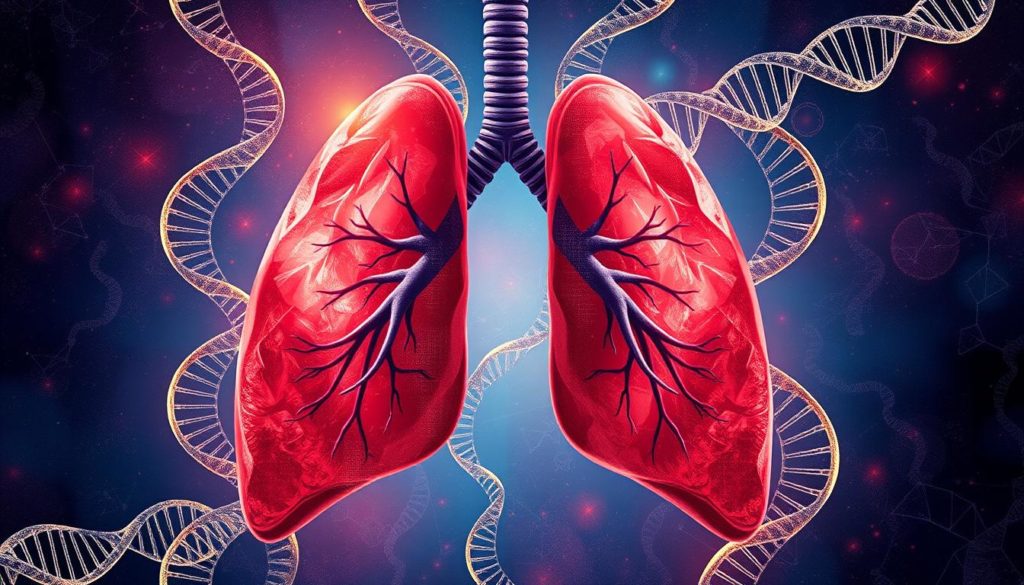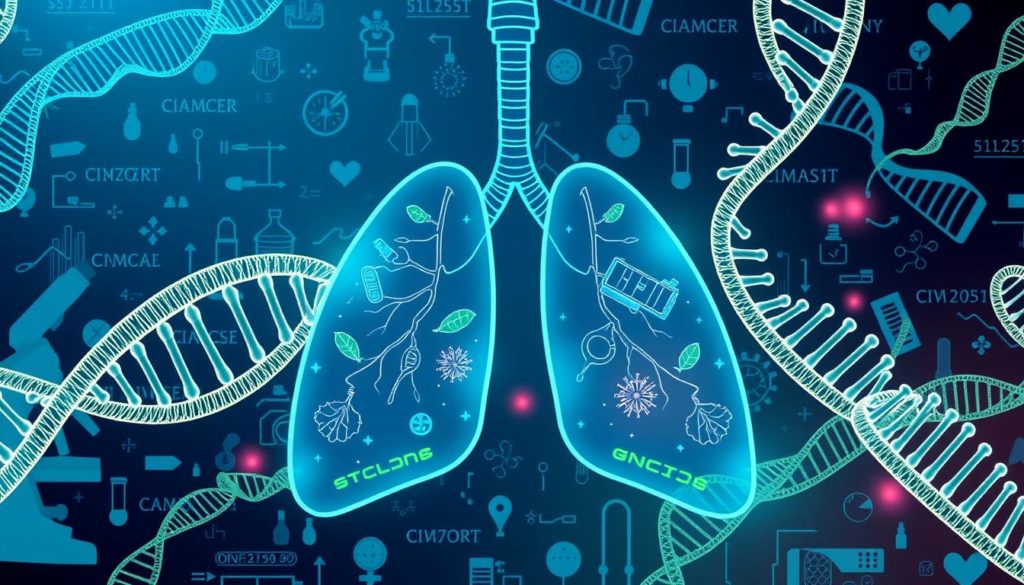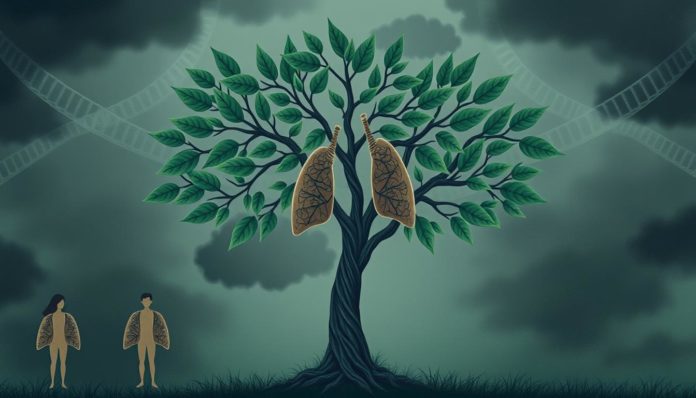Nearly 20% of those who die from lung cancer in the U.S. each year are non-smokers. This highlights the need to understand other risk factors. These include lung cancer inheritance and familial lung cancer.
Smoking is the top risk factor for lung cancer, but genetics and environment also matter. Having a close family member with lung cancer raises your risk 2 to 3 times. Yet, hereditary lung cancer risk only explains about 8% of cases. This shows the complex relationship between our genes and our surroundings.
Knowing your family’s health history and talking about it with a doctor can save your life. Gene mutations can affect how cells grow and repair DNA, leading to lung cancer and genetics. Around 60% of lung adenocarcinomas have specific gene mutations. Being around smokers in your home can also increase your risk of familial lung cancer.
Understanding Lung Cancer: An Overview
Lung cancer is a top cause of death from cancer around the world. Medical breakthroughs haven’t stopped it from taking many lives. Smoking is a big reason for lung cancer, showing its huge effect on death rates.

Lung cancer can also happen in people who never smoked. This points to a mix of causes. Things like radon gas, asbestos, and diesel fumes matter too. It’s important to look at both smokers and non-smokers to get the full picture.
The science behind lung cancer is fascinating. Changes in DNA and certain cell pathways are key. Exploring these changes helps find new ways to treat or prevent cancer.
| Contributing Factors | Details |
|---|---|
| Smoking | Primary contributor to lung cancer. Direct link to significant mortality rates. |
| Genetic Risk | Lung cancer genetic predisposition impacts both smokers and never smokers. |
| Environmental Factors | Includes radon gas, asbestos, diesel exhaust, and heavy metals. |
| Molecular Changes | DNA alterations and oncogenic pathways are crucial in understanding lung cancer development. |
The mix of genetics, environment, and lifestyle paints a complex cause of lung cancer. More research is working to uncover the causes. This aims to better prevent this disease.
Genetic Factors in Lung Cancer
It’s key to understand the genetic aspects of lung cancer for risk identification. Genetic mutations impact the start and growth of this disease. Let’s look closer at gene effects on cancer and note common mutations related to lung cancer.
How Genes Influence Cancer Formation
Genes help control how cells grow, divide, and die. Oncogenes and tumor suppressor genes keep these processes in check. But mutations can upset this balance, causing cells to divide uncontrollably. This leads to tumors. Also, some inherited mutations might weaken the body’s defense against DNA damage or toxins, raising lung cancer risks.

Common Genetic Mutations Linked to Lung Cancer
Some genetic mutations are often seen in lung cancer, guiding treatment. Mutations in the EGFR and KRAS genes are common in non-small-cell lung cancer (NSCLC). These changes help doctors decide on treatment, as some drugs target specific mutations. Knowing these mutations helps in tailoring medicines to each patient, making treatments more accurate and successful.
Here’s a look at some usual genetic mutations in lung cancer:
| Gene | Mutation Type | Implication | Targeted Therapy |
|---|---|---|---|
| EGFR | Exon 19 Deletions | Increased cell growth | Gefitinib, Erlotinib |
| KRAS | Point Mutations | Resistance to standard therapy | Sotorasib |
| ALK | Gene Rearrangements | Abnormal signaling | Crizotinib |
Understanding lung cancer’s genetic factors lets doctors better gauge risks and tailor treatments. This improves chances of successful outcomes for patients.
Familial Lung Cancer: Is it Hereditary?
Familial lung cancer remains an important study area. Experts are looking into if genetics increase risk. They are exploring how genetics and environment together affect this.
Understanding Familial Risk
To understand familial lung cancer risk, researchers do familial aggregation studies. These studies show that people with a family history of lung cancer are more likely to get it. The risk comes from genetics and shared environments.
Role of Shared Environmental Factors
Environmental factors greatly affect familial lung cancer risk. Being around household tobacco smoke or other carcinogens in the family can raise the chance of getting lung cancer. Also, having similar lifestyles, like the way we eat and our physical activity, plays a part.
Looking at both environmental factors and genetics helps us fully understand familial lung cancer.
How Common is Inherited Lung Cancer?
Inherited lung cancer is quite rare. It adds to the total cases of the disease. Many lung cancers come from inherited gene changes. It’s important to know about lung cancer genetic predisposition to spot high-risk groups.
A few lung cancer cases are familial. Research keeps working to figure out how common it is. The role of inherited factors in lung cancer is complex.
Scientists are looking into genetic tests. They want to understand familial lung cancer better. This could lead to early action and treatments focused on genetic risks.
Here are some key facts and findings about familial lung cancer:
| Topic | Insight |
|---|---|
| Heritable Gene Mutations | They account for a minority of lung cancer cases. |
| Prevalence of Familial Lung Cancer | Represents a small subset, still under research debate. |
| Current Studies | Actively contributing to a nuanced disease understanding |
Is Lung Cancer Genetic?
Is lung cancer caused by genes or the environment? It’s important to look at both. The mix of inherited genes and environmental factors makes lung cancer complicated.
Genetic Predisposition vs. Environmental Causes
Genes and the environment both affect lung cancer risk. Family history can point to genetic risk. But, things like smoking and harmful substances matter too. Knowing both sides helps us understand risk better.
Statistics and Research Findings
Research shows lung cancer’s complexity. Having relatives with lung cancer raises your risk. But, most lung cancer comes from gene changes during life, often due to the environment.
| Factor | Impact on Lung Cancer Risk |
|---|---|
| Genetic Predisposition | High among families with history |
| Environmental Exposure | Significant due to smoking, radon, etc. |
| Combined Influence | Complex and interrelated impacts |
Studies are ongoing, exploring the roles of genes and environment in lung cancer. This research aims to better guide prevention and treatment plans.
Genetic Testing for Lung Cancer Risk
Genetic testing for lung cancer is now key in modern healthcare. It is vital for those with a family history or certain genetic mutations. These factors can change how lung cancer is treated. So, knowing when to get tested and what tests are out there is crucial.
Who Should Consider Genetic Testing?
Some people should think about genetic testing for lung cancer. Those with a family history of the disease or early-onset lung cancer benefit most. Also, individuals of certain ethnicities or with a known genetic mutation in the family should look into it. Genetic testing can find mutations that help doctors pick the best treatment.
Available Genetic Tests and Their Findings
Today, there are many genetic tests for lung cancer. Tests often target EGFR and KRAS genes. These genes are crucial for creating targeted treatments. Let’s go over some tests and the mutations they focus on:
| Test Name | Target Mutations | Significance |
|---|---|---|
| EGFR Mutation Test | EGFR Exon 19 deletions, L858R | Aids in selecting tyrosine kinase inhibitors |
| KRAS Mutation Test | KRAS G12C, G12D | Helps avoid ineffective therapies |
| Comprehensive Genomic Profiling | Various genes including ALK, ROS1 | Provides a broad spectrum analysis for targeted treatment |
These tests allow doctors to craft better treatment plans. This leads to better outcomes for patients. By using these genetic tests, cancer care becomes more tailored to each person.
Non-Smoking-Related Genetic Risks
Smoking is well-known for causing lung cancer. But, other factors matter too. Exposure to radon gas is a major non-smoking risk. This gas comes from the ground and enters homes and buildings. It poses big health risks.
Radon Gas and Other Environmental Factors
Other things in our environment can also cause lung cancer. For instance, asbestos, diesel exhaust, and certain metals raise your risk. Asbestos used in construction is harmful. Diesel exhaust and metals from factories add to lung cancer cases among non-smokers.
Secondhand Smoke and Genetic Vulnerability
Even if you don’t smoke, secondhand smoke can still hurt you. It has many cancer-causing chemicals. Some people’s genes make them more likely to get sick from secondhand smoke and other harmful stuff. Knowing about these risks helps in fighting lung cancer.
Genes Specifically Linked to Lung Cancer Types
Studying the genes behind lung cancer helps us understand this disease better. The main players are genes called oncogenes and tumor suppressor genes. These genes either speed up or slow down tumor growth.
Oncogenes and Tumor Suppressor Genes
Oncogenes can lead to cancer if they mutate or become overly active. Tumor suppressor genes, on the other hand, keep cell division in check and prevent tumors. Keeping these genes balanced is crucial for cells to function normally. When this balance is upset, it can lead to different types of lung cancer.
EGFR and KRAS Mutations in NSCLC
Non-small-cell lung cancer (NSCLC) is often linked to changes in certain genes, like EGFR and KRAS. EGFR mutations are common in many NSCLC patients and affect how they respond to specific drugs. KRAS mutations also play an important part but can make treatments less effective.
| Gene | Mutation Type | Impact on NSCLC | Therapeutic Response |
|---|---|---|---|
| EGFR | Mutations | Dramatically affects cell growth | Responsive to targeted EGFR inhibitors |
| KRAS | Mutations | Plays a key role in tumor development | Often resistant to targeted therapies |
Preventative Measures and Lifestyle Choices
Changing our lifestyle is key to preventing lung cancer. By choosing wisely, we can cut our risk a lot. Important changes include stopping smoking and eating foods that are good for our lungs.
Quitting Smoking and Avoiding Secondhand Smoke
Quitting smoking is the best way to prevent lung cancer. Cigarette chemicals are major causes of lung cancer. Being around smoke from others also increases your risk. Getting rid of these smoke sources greatly lowers cancer risk for everyone.
Diet and Nutritional Impact
Eating right is also vital in stopping lung cancer. A diet full of fruits and vegetables offers antioxidants and nutrients that fight cancer. These plant foods protect our lungs and help the body’s defense against cancer. Eating well is great for your overall health, which also helps in preventing lung cancer.
- Eat more fruits and veggies.
- Eat less processed and red meats.
- Add antioxidants and vitamins like C and E.
The Role of Genetic Counseling
Genetic counseling for lung cancer is crucial for people with a big family history of the disease. It helps patients understand the role of genetics in their health. This process looks closely at personal and family medical histories to find possible inherited cancer risks. Some tumors need genetic evaluation even without family history, making risk assessments more accurate.
This counseling offers deep insights into genetic testing. Counselors help make sense of complex testing results. They explain how these results could affect a patient’s health now and in the future. They also share ways to handle discovered risks, like check-ups, lifestyle changes, or preventive actions. This advice is key for patients deciding on their health plans.
Genetic counseling also talks about how genes and lifestyle mix. Counselors discuss how the environment and life choices can lower risks. They cover topics like radon, secondhand smoke, and diet. So, genetic counseling is not just about finding risks. It’s a full plan for better lung cancer care outcomes.
FAQ
Is lung cancer genetic or primarily caused by environmental factors?
Lung cancer can be influenced by both genetics and the environment. Smoking is the biggest risk factor. But, genes and things like radon gas, asbestos, and secondhand smoke matter too.
How does a family history of lung cancer affect my risk?
Having family members with lung cancer can double or triple your risk. Familial cases make up about 8% of lung cancer cases. It’s key to look at both genetics and environment.
What genetic mutations are commonly linked to lung cancer?
Common mutations found in lung cancer affect the EGFR and KRAS genes. These are seen in non-small-cell lung cancer and are important for treatment choices.
Can lung cancer be inherited directly?
Inherited lung cancer is rare. Yet, some gene mutations can make it hard for the body to fix DNA damage or clean out toxins, raising the lung cancer risk.
Is genetic testing recommended for assessing lung cancer risk?
Genetic testing is advised for people with a strong family history of lung cancer or those with actionable mutations. New technology has made these tests more accurate, helping craft personal treatment plans.
How do environmental factors like radon gas affect lung cancer risk in non-smokers?
Radon gas is the top lung cancer cause in non-smokers. Other factors, like asbestos and diesel exhaust, play a role too. If you’re genetically prone, your risk goes up.
How do oncogenes and tumor suppressor genes relate to lung cancer?
Oncogenes and tumor suppressor genes help control cell growth and death. Changes in these genes can cause cells to grow wildly and form tumors, leading to lung cancer.
What lifestyle choices can help prevent lung cancer?
Not smoking or being around smoke is key to prevention. Eating lots of fruits and veggies, which have antioxidants, also helps lower your risk.
What is the role of genetic counseling in managing lung cancer risk?
Genetic counseling helps educate and assess risk for those with a family history of lung cancer. Counselors explain genetic factors, testing importance, and how to manage risk.


